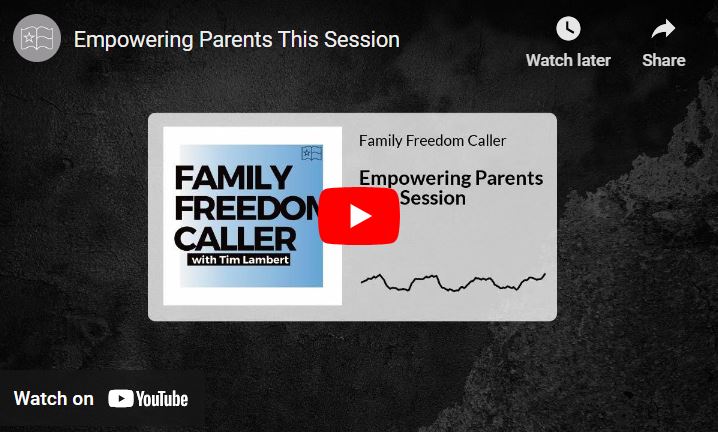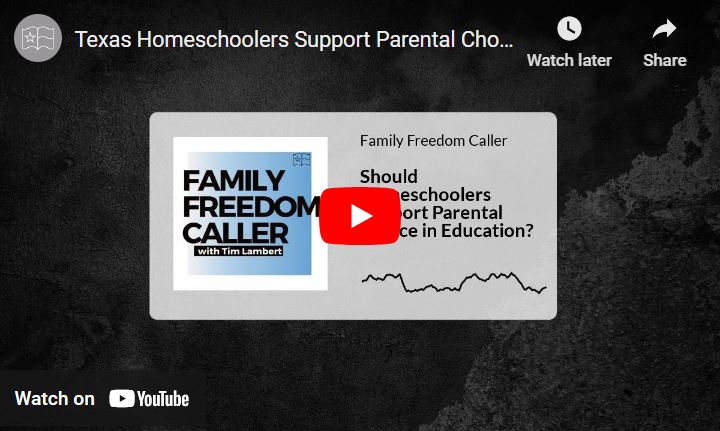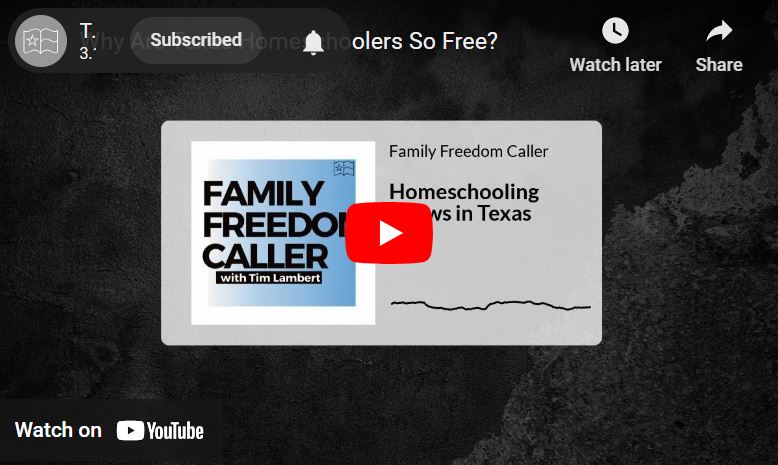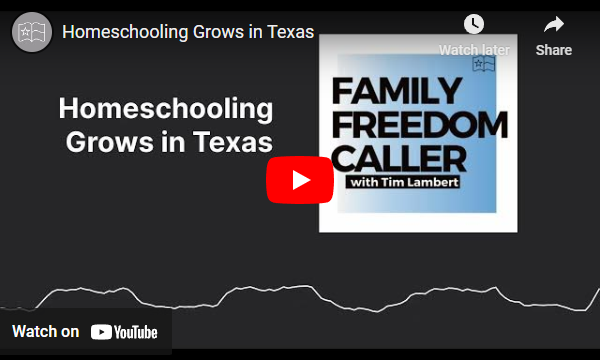
Two years ago, Texas Home School Coalition (THSC) helped ensure that the Pardo family was exonerated in one of the most high-profile Texas CPS cases in recent history. On October 1 of this year, DFPS, the umbrella agency for Child Protective Services (CPS), adopted rules designed to thwart THSC and other advocates from helping innocent families.
These rules kneecap many of the only defenders that families have. They do not protect children. Instead, they hinder support for families in a complex government system where more than 60% initial accusations are ruled out.
In a policy memo, the agency explained that the changes were needed in response to “the frequency with which DFPS interacts with advocacy organizations, such as parent rights advocates and homeschool coalitions….”
The ambiguity of the adopted rules and context around their creation point to a targeted attempt to sideline THSC and family advocates from the CPS process.
Success of THSC and Family Advocates Prompts Targeted Changes
It is notable that the new rules target organizations or individuals involved in the Pardo case, a high-profile CPS case in which THSC raised $130,000 to defend a THSC member family whose 4-year-old son had been illegally removed.
THSC took the case all the way to the Texas Supreme Court, and, along with the family’s team of advocates, fought for nearly six months to defend them before CPS finally admitted defeat and dropped the charges. The case against the Pardo family was dismissed in December of 2019.
Family Advocates Krista McIntire and Parent Guidance Center advocates Johana Scot and Judy Powell were instrumental members of the family’s team during this time as well. They assisted with everything from meetings with CPS to reviewing thousands of pages of complex medical documents to preparing for upcoming court hearings.
In a meeting with McIntire and Scott in 2020, a top-ranking CPS official suggested that rules were needed to control the operations a family advocates. He finally declared that family advocates were “interfering with CPS investigations” – potentially a crime.
During the 2021 legislative session, THSC’s flagship CPS reform bill and numerous other CPS reform bills sailed through the legislature. The Pardo case was frequently cited by lawmakers as a high-profile example of why many of these long-asked-for reforms were necessary.
Many see this legislation as the most significant pro-family CPS reforms to ever pass in Texas.
On September 1 of 2021, these bills went into effect. On October 1, CPS released its new rules restricting the involvement of “parent rights advocates and homeschool coalitions” in CPS cases.
Given this context, it is hard to see these new rules as anything other than a direct response to CPS’ failure in the Pardo case, the 2021 CPS legislative reforms, and CPS’ objection to pro-family groups protecting innocent Texas families from unjust investigations.
What is in the New Rules?
The new rules are all tied together by a common thread: They restrict the ability of families to receive help from advocates during CPS cases. The rules include:
- Preventing an advocate from receiving case information directly from CPS.
- Instructing caseworkers to cut advocates out of communications and reply only to the family or attorney.
- Allowing caseworkers to kick a family advocate out of meetings with the family if the advocate is “disruptive.”
- The term “disruptive” is not defined.
- The common practice of many caseworkers is to bully a family or seek a court order to respond to anything deemed non-cooperative.
- Directing CPS to interview a child without the family advocate present or, if the advocate insists on being present, seek court approval to exclude the advocate.
What can you do?
First, the public and lawmakers must be made aware of the dangers of these new rules and the concerning context behind their creation. These rules will impact the lives of children and their families.
While CPS may have seemingly endless resources, many families have no way to defend themselves. CPS should not be permitted to sideline advocates who may be the only supporters a family has.
The Texas Supreme Court Children’s Commission recently weighed in on the desperate need that families have for advocates, recommending in May that the legislature provide court appointed legal representation for families from the moment that CPS files suit for removal of a child.
Contact your State Representative and State Senator and ask them to:
- Demand that CPS repeal these unnecessary and unjust regulations that harm families.
- Consider legislation that would help ensure families in CPS cases receive the legal and practical support that they need.”
CPS exists to protect children from horrible abuse and neglect. But when they forget that their ultimate goal is to promote what’s best for kids, not what’s easiest for CPS, innocent families like the Pardos pay the price.
Groups like THSC and advocates like Krista McIntire, Johana Scot, and Judy Powell stand in the gap to help equalize the discrepancy of power and resources. They protect innocent families like the Pardos.
Without advocates, many families without the means to defend themselves would be railroaded and forgotten.
We believe in empowering parents to raise and educate their children the way they see fit. We need your help to make sure the public knows what is happening. Share this article with your friends, family, and lawmakers to help keep CPS accountable. Help us in our mission of Keeping Texas Families Free by joining as a THSC member or making a donation to THSC today!

Two years ago, Texas Home School Coalition (THSC) helped ensure that the Pardo family was exonerated in one of the most high-profile Texas CPS cases in recent history. On October 1 of this year, DFPS, the umbrella agency for Child Protective Services (CPS), adopted rules designed to thwart THSC and other advocates from helping innocent families.
These rules kneecap many of the only defenders that families have. They do not protect children. Instead, they hinder support for families in a complex government system where more than 60% initial accusations are ruled out.
In a policy memo, the agency explained that the changes were needed in response to “the frequency with which DFPS interacts with advocacy organizations, such as parent rights advocates and homeschool coalitions….”
The ambiguity of the adopted rules and context around their creation point to a targeted attempt to sideline THSC and family advocates from the CPS process.
Success of THSC and Family Advocates Prompts Targeted Changes
It is notable that the new rules target organizations or individuals involved in the Pardo case, a high-profile CPS case in which THSC raised $130,000 to defend a THSC member family whose 4-year-old son had been illegally removed.
THSC took the case all the way to the Texas Supreme Court, and, along with the family’s team of advocates, fought for nearly six months to defend them before CPS finally admitted defeat and dropped the charges. The case against the Pardo family was dismissed in December of 2019.
Family Advocates Krista McIntire and Parent Guidance Center advocates Johana Scot and Judy Powell were instrumental members of the family’s team during this time as well. They assisted with everything from meetings with CPS to reviewing thousands of pages of complex medical documents to preparing for upcoming court hearings.
In a meeting with McIntire and Scott in 2020, a top-ranking CPS official suggested that rules were needed to control the operations a family advocates. He finally declared that family advocates were “interfering with CPS investigations” – potentially a crime.
During the 2021 legislative session, THSC’s flagship CPS reform bill and numerous other CPS reform bills sailed through the legislature. The Pardo case was frequently cited by lawmakers as a high-profile example of why many of these long-asked-for reforms were necessary.
Many see this legislation as the most significant pro-family CPS reforms to ever pass in Texas.
On September 1 of 2021, these bills went into effect. On October 1, CPS released its new rules restricting the involvement of “parent rights advocates and homeschool coalitions” in CPS cases.
Given this context, it is hard to see these new rules as anything other than a direct response to CPS’ failure in the Pardo case, the 2021 CPS legislative reforms, and CPS’ objection to pro-family groups protecting innocent Texas families from unjust investigations.
What is in the New Rules?
The new rules are all tied together by a common thread: They restrict the ability of families to receive help from advocates during CPS cases. The rules include:
- Preventing an advocate from receiving case information directly from CPS.
- Instructing caseworkers to cut advocates out of communications and reply only to the family or attorney.
- Allowing caseworkers to kick a family advocate out of meetings with the family if the advocate is “disruptive.”
- The term “disruptive” is not defined.
- The common practice of many caseworkers is to bully a family or seek a court order to respond to anything deemed non-cooperative.
- Directing CPS to interview a child without the family advocate present or, if the advocate insists on being present, seek court approval to exclude the advocate.
What can you do?
First, the public and lawmakers must be made aware of the dangers of these new rules and the concerning context behind their creation. These rules will impact the lives of children and their families.
While CPS may have seemingly endless resources, many families have no way to defend themselves. CPS should not be permitted to sideline advocates who may be the only supporters a family has.
The Texas Supreme Court Children’s Commission recently weighed in on the desperate need that families have for advocates, recommending in May that the legislature provide court appointed legal representation for families from the moment that CPS files suit for removal of a child.
Contact your State Representative and State Senator and ask them to:
- Demand that CPS repeal these unnecessary and unjust regulations that harm families.
- Consider legislation that would help ensure families in CPS cases receive the legal and practical support that they need.”
CPS exists to protect children from horrible abuse and neglect. But when they forget that their ultimate goal is to promote what’s best for kids, not what’s easiest for CPS, innocent families like the Pardos pay the price.
Groups like THSC and advocates like Krista McIntire, Johana Scot, and Judy Powell stand in the gap to help equalize the discrepancy of power and resources. They protect innocent families like the Pardos.
Without advocates, many families without the means to defend themselves would be railroaded and forgotten.
We believe in empowering parents to raise and educate their children the way they see fit. We need your help to make sure the public knows what is happening. Share this article with your friends, family, and lawmakers to help keep CPS accountable. Help us in our mission of Keeping Texas Families Free by joining as a THSC member or making a donation to THSC today!










